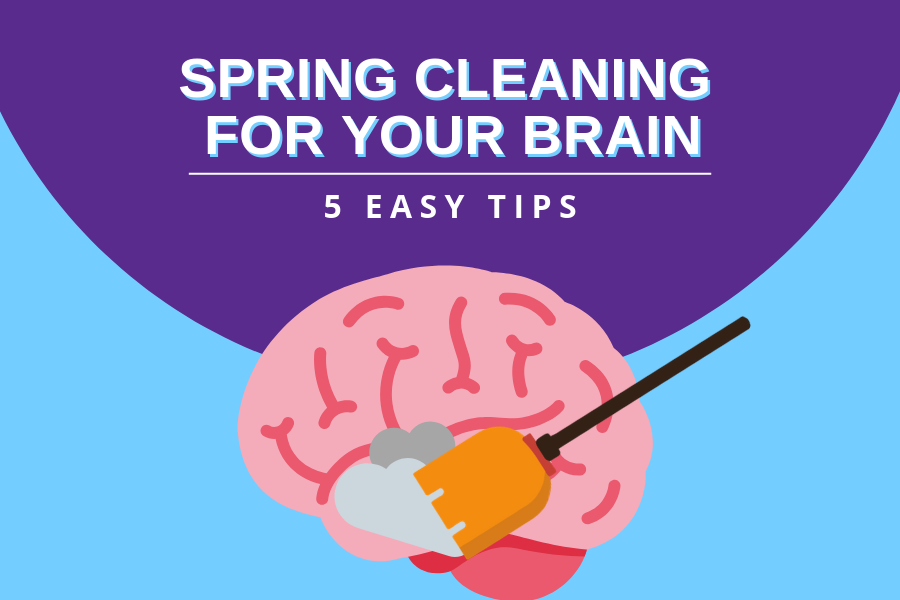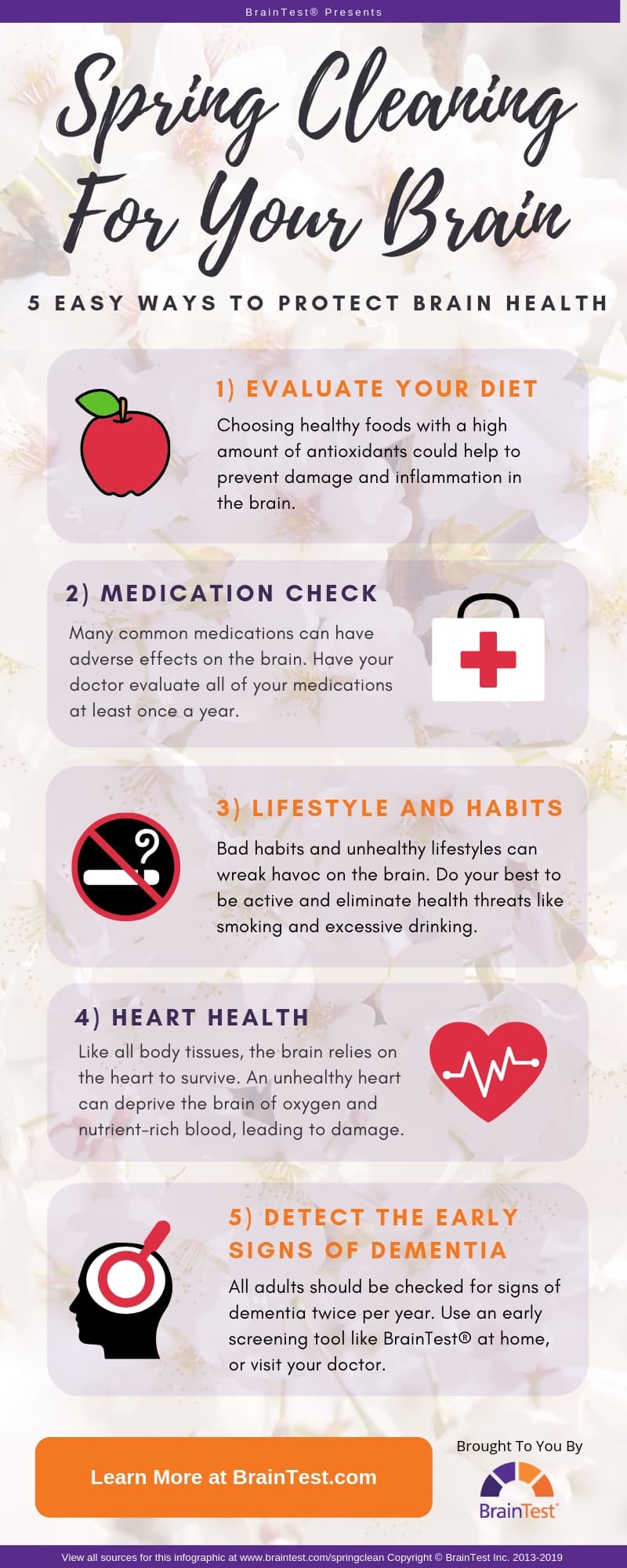Spring Cleaning for Your Brain

Spring has sprung, and many people are turning their attention to the annual tradition of spring cleaning. This is an excellent ritual for maintaining a healthy living environment, but what if we applied the same approach to our brains?
Just like our homes, the brain can become an unhealthy place if we do not take the time to clean out the trash that can accumulate over time. Luckily, this is a much less labor-intensive task than cleaning a house. Instead of brooms, dust pans, and mops, the best tools for spring cleaning the brain are awareness and dedication.
This article and the accompanying infographic will help you become aware of the ways in which you can safeguard your brain health by preventing the accumulation of potentially harmful substances (or, in spring cleaning terms, by “taking out the trash”). However, it is up to you to provide the dedication required to actually carry out the actions. Sometimes, it takes a bit of motivation to start spring cleaning, but it is always worth the effort in the end.
Five Tips for Spring Cleaning Your Brain

Tip 1: Evaluate Your Diet
There are many ways that human health is affected by the type of foods we consume. In the majority of conversations about the benefits of a healthy diet, the focus is often placed on things like nutritional needs, weight, body fat, and ease of digestion. While all of these outcomes are important for maintaining both a healthy body and mind, people do not often discuss the diet as it directly relates to the brain.
One of the best dietary decisions that can be made to protect brain health is the inclusion of foods that are high in antioxidants (many types of berries, dark chocolate, red cabbage, and much more). To understand the importance of antioxidants, we must first discuss the threat of free radicals to human health. Free radicals are a wide range of highly reactive chemical substances that could enter the human body and potentially cause damage to tissues.
Free radicals can come from a variety of sources, like pollution in the environment and even as a result of normal biological processes within the body. Antioxidants help by neutralizing free radicals before they can react with body tissues (like those that make up the brain). So, the more antioxidants we include in our diet, the less damage will be done to our brains and other tissues by free radicals.
Tip 2: Check Your Medications
Let us be clear before we begin that we are in no way suggesting that anyone stops taking a medication without consulting a doctor. With that said, it is an undeniable fact that many common drugs (both prescribed and over the counter) are known to have adverse side effects on the brain. Some examples include:
- Diphenhydramine: This is a medication used for the treatment of allergies (in Benadryl), nausea (in Dramamine), and other ailments. It has been linked with an increased risk of developing dementia.
- Benzodiazepines: Anti-anxiety medications like diazepam (Valium) and alprazolam (Xanax) have been associated with a wide range of cognitive impairments, including Alzheimer’s Disease, and can be highly addictive.
- Statins: These cholesterol-reducing medications, such as atorvastatin (Lipitor) and rosuvastatin (Crestor), can cause temporary confusion and memory problems.
In many cases, the benefits of these medications (especially those prescribed by a doctor) far outweigh the risks associated with their side effects. However, it is not uncommon for people to end up taking medications they do not really need, either by purchasing them over the counter or due to changes in their health. For these and other reasons, it is a good idea to have a medical professional evaluate your medications at least once a year, especially if you are experiencing any adverse symptoms like those related to brain health (impairments in memory, mood, judgment, or other mental processes).
Tip 3: Adjust Your Lifestyle and Habits
This section could easily turn into a lecture so we will do our best to keep it brief. Most of us are aware that our lifestyle choices and personal habits can have a direct impact on physical health. Like the rest of the body, the brain is also prone to damage from unhealthy lifestyles, leading to impairments in mental health, neurodegenerative diseases, and other afflictions.
We can do our best to avoid these issues by making healthy choices, like exercising, eating well, and getting enough sleep when possible. Bad habits are relatively obvious and include things like smoking, excessive alcohol consumption, and being sedentary. Making these changes is far easier said than done, and may require the most dedication of all the strategies included in this article. However, it is undoubtedly a worthy goal that we are all capable of achieving with enough time and effort.
Tip 4: Give Your Heart Some Love
Just like the brain, the human heart is a vital organ that can easily fall victim to neglect. Heart health is a critical part of overall well-being. Damage to the heart from disease, lifestyle, habits, diet, or any other source will have a negative effect on the entire body, including the brain. In fact, several types of heart conditions have even been linked with the development of dementia.
The heart is responsible for pumping blood to the rest of the body. Blood carries oxygen and other vital substances to the body’s cells. When the heart or any other part of the circulatory system (arteries, vessels, and capillaries) is impaired, it can cause severe damage throughout the body. Like all organs and tissues, the brain relies on its blood supply to function correctly. Accordingly, a healthy heart contributes to a healthy mind.
Tip 5: Get Checked for the Early Signs of Dementia
There are many misconceptions about dementia that may be preventing people from getting tested for the early signs of its development. Dementia is not a normal part of aging, and, while most types of dementia are more commonly found in older people, there are many cases where it strikes in middle or even young adulthood. No type of dementia (Alzheimer’s disease, Lewy body dementia, etc.) can be cured, but there are treatments that can be helpful, especially during the early stages. Unfortunately, these benefits cannot be accessed without first being diagnosed.
The earliest signs of dementia can currently only be detected with a written cognitive evaluation that has to be evaluated by a medical professional. These tests can typically be completed in about 30 minutes and should be repeated every six months. For people who cannot get to a doctor for some reason (disability, travel constraints, lack of access, etc.), or who would rather do the test at home on their own time, the BrainTest® app offers an easy to use electronic option.
Summer, Fall, and Winter Cleaning
Spring cleaning season is a great time to remind yourself that your brain likely needs some tidying as well, but we would all be much better off if we paid attention to brain health throughout the entire year. In fact, some of the suggested tips (particularly the adjustment of lifestyle and habits) require a lifetime of practice and dedication to reap the full rewards. The bottom line is that in order to be healthy, we must live healthily. This applies to our environment, body, and mind. Spring cleaning is a great time to adopt healthier routines that can last a lifetime.
Click here to view all sources for this article.
